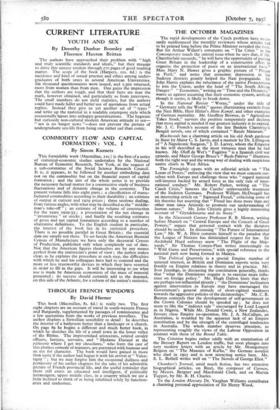THE OCTOBER MAGAZINES
The rapid developments of the Czech problem have neces- sarily outdistanced the monthly reviewers whose articles had to be printed king before the Prime Minister revealed the facts. But Sir Arthur Willert's comments on " The Crisis " in the Contemporary touch the central issue when he says that, if Mr. Chamberlain succeeds, " he will have the opportunity of putting Great Britain in the leadership of a constructive effort to organise the protection of peace on an international basis." Miss Mary N. Hawes gives a graphic picture of " Prague in Peril," and notes that economic depression in the Sudeten districts greatly helped the Nazi propaganda. Sir John Harris explains the reluctance of the native Protectorates to join the Union, under the head of " The South African Danger." " Economist," writing on " Time and the Dictators," warns us against assuming that their economic system, artificial though it seems, is likely to break down.
In the National Review " Wotan," under the title of " Germany tells the World," quotes illuminating extracts from the Nazi Bible, Herr Hitler's Mein Kampf, and other examples of German mentality. Mr. Geoffrey Browne, in " Agriculture Takes Stock," surveys the position temperately and declares that more capital is needed if our greatest industry is to expand. Mr. J. C. French's account of the late Bankim Chatterjee's Bengali novels, one of which contained " Bande Mataram."
Blackwoods has a charming article on his old Arab gardener in Sinai by Major C. S. Jarvis, and a memoir by Dr. Lillingson of " A Napoleonic Surgeon," J. D. Larrey, whom the Emperor in his will described as the most virtuous man that he had known. Mr. Oloff de Wet's " Fugitive " is a Spanish civil war episode, and Major George Bruce's " Bush-Palaver ' illustrates both the right way and the wrong way of dealing with suspicious native chiefs in West Africa.
The Fortnightly opens with an editorial article on " The Loom of Power," enforcing the view that we must concern our- selves with Europe and challenge those who " regard national self-interest backed by armed force as the only rule of inter- national conduct." Mr. Robert Parker, writing on " The Czech Crisis," laments the Czechs' unfavourable treatment of the Sudeten Germans. Professor William. McDougall has an interesting article on " Sigmund Freud," criticising some of his theories but asserting that Freud has done more than any other man since Aristotle to promote our understanding of human nature." Mr. John Christie gives a highly interesting account of " Glyndebourne and its Story."
In the Nineteenth Century Professor R. B. Mowat, writing before Munich on " Central Europe and the Concert of Great Powers," argues that personal contact with the dictators should be useful. In discussing " The Future of International Law," Mr. W. A. Hirst commits himself to the paradox that the League of Nations has diminished respect for law. Sir Archibald Hurd enforces anew " The Plight of the Ship- yards." Sir Thomas Comyn-Platt writes interestingly on " Wild Game and Preservation," with special reference to the national park now being formed in Malaya.
The Political Quarterly is a special Empire number of unusual interest, as British and Dominion experts write very frankly on Empire relations in theory and in practice. Mr. Ivor Jennings, in discussing the constitution generally, thinks that " what the Dominions require is to exercise more influ- ence on foreign policy." Mr. Hugh Dalton hints that they are perhaps too influential already ; "'the Dominions' inclination against intervention in Europe may have encouraged the Government's general attitude of short-sighted weakness towards the aggressive policies of the dictatorships." Mr. C. R. Buxton contends that the development of self-government in the Crown Colonies should be speeded up ; he does not seem to like the " indirect rule "'encouraged by Lord Lugard as in Nigeria, While Mr. Donald Cowie, a New Zealander, favours close Empire co-operation, Mr. J. A. McCallum, an Australian, is troubled by the apparent lack of an Empire constitution and by the strength of the centrifugal tendencies in Australia. The whole number deserves attention, as representing roughly the views of the Labour Opposition in contrast with those of the Round Table.
The Criterion begins rather oddly with an examination of the Bressey Report on London traffic,' but soon plunges into very modern letters with an article by Mr. Montgomery Belgion on " The Measure of Kafka," the German novelist who died in 1925 and is now attracting notice here. Mr. S. L. Bethell writes well on " The Novels of George Eliot."
Chambers's Journal, amid much fiction, has two attractive biographical articles, on Bizet, the composer of Carmen, by Messrs. Bergner and Macdonald Clark, and on Martin Tupper, by Mr. R. H. Charles.
To the London Mercury Dr. Vaughan Williams contributes a charming penonal appreciation of Sir Henry WoOd.














































 Previous page
Previous page